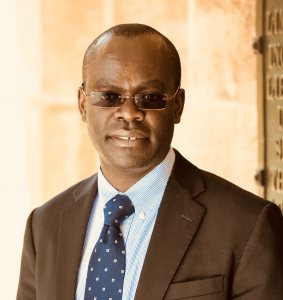
Patrick W. Otim
Associate Professor of History
Associations
History
Africana
About
About
I am an associate professor of history at Bates College and a faculty member in the Africana Program. Previously, I was a Mellon Diversity and Faculty Renewal Postdoctoral Fellow.
Education
A.B., Makerere University
PGDip in Conflict and Peace Studies, Gulu University
PGDip in Education, Gulu University
M.A., University of Notre Dame
M.A., University of Wisconsin–Madison
Ph.D., University of Wisconsin–Madison
Recent Awards
National Endowment for the Humanities Fellowship, 2024–2025
Philips Fellowship, Bates College, 2024–2025
Mellon Diversity Faculty Renewal Postdoctoral Fellowship, Bates College, 2016–2017
Research
My research and teaching interests include African intellectual history, Christianity and Islam,
race and ethnicity, health and healing, and transitional justice.
My first book, Acholi Intellectuals: Knowledge, Power, and the Making of Colonial
Northern Uganda, 1850–1960 (Athens: Ohio University Press, 2024), is an intellectual history of
the Acholi people in northern Uganda. It examines the roles of Acholi leaders—whom I call
Acholi intellectuals or, in certain contexts, precolonial or transitional intellectuals—in the spread
of Christianity and colonial rule in northern Uganda. They included oteka (war leaders), lu or Pa
rwodi (royal messengers), ajwakaker (royal healers), lutumpiny (priests), and lugo-nanga (poet-
musicians).
This book’s fundamental contention is that the first group of Acholi who became mission
and colonial employees were not ordinary or marginalized young men, as Europeans had
portrayed them. Rather, they were much more sophisticated. In fact, their lives contrasted
sharply with Europeans’ depictions. They joined Europeans from positions of power and brought
with them significant knowledge, skills, and experiences, coupled with sociopolitical status and
legitimacy. These attributes, I argue, gave the Acholi intellectuals considerable leverage,
allowing them to play a pivotal yet overlooked role in the transition to, and spread of,
Christianity and colonial rule. They contributed significantly to the success of European projects
but in ways many Europeans did not fully understand at the time because they were ignorant of
their Acholi employees’ backgrounds, especially the kind of power and authority they wielded.
My second book project, supported by a fellowship from the National Endowment for the Humanities and a Philips Fellowship, is tentatively titled Caught in between the Warring Parties: A History of Terror and Survival in Northern Uganda, 1950–2008. This project aims to offer a fresh look at the war between the Lord’s Resistance Army (LRA) and the government of Uganda (GoU). Specifically, it seeks to shift the focus away from the LRA, the GoU, and the different categories of victims—such as child soldiers, women who were abducted and forced to marry LRA commanders and bear their children, and victims of wartime sexual crimes—to everyday, ordinary people who experienced the war in their homes or camps. At its core, the project asks: How did ordinary civilians manage to keep alive? I am hoping not only to uncover decisions and choices ordinary people made during wartime, but also to offer a more nuanced insight into the multiple contours of sufferings of everyday ordinary people.
Selected Publications
Book
Acholi Intellectuals: Knowledge, Power, and the Making of Colonial Northern Uganda, 1850–1960
(Athens: Ohio University Press, 2024).
Journal Articles
“The ‘Iron Donkey’: The Social Lives of Bicycles in Northern Uganda, 1903–2015,” Critical African Studies 15, no.3 (2023): 374–393. Winner of the Critical African Studies Prize for Critical Scholarship in African Studies
“Acholi Royal Messengers: Mobility in Late Precolonial and Early Colonial Northern Uganda, 1870s to 1920,” Stichproben: Vienna Journal of African Studies 44, (2023): 25–45.
“‘Returning to the World of Ancestors’: Death and Dying among the Acholi of Northern Uganda, 1900s–1980s,” Journal of East African Studies 16, no.3 (2022): 375–394 (co-authored with Dr. Julaina Obika).
“Weapons of Warfare? The History of Firearms among the Acholi of Northern Uganda, 1850s–1920s,” International Journal of African Historical Studies 55, no. 2 (2022): 231–258.
“The Fate of a Transitional Chief in Colonial Acholiland: Iburaim Lutanyamoi Awich, 1850s–1946,” Canadian Journal of African Studies 55, no. 1 (March 2020): 57–77.
“Local Intellectuals: Lacito Okech and the Production of Knowledge in Colonial Acholiland,” History in Africa 45 (June 2018): 275–305.
Book Chapters
“‘Strange Men Who Call Themselves Chiefs’: The Practice of Power and Authority Among the Acholi of Northern Uganda,” in Textures of Power: Central Africa in the Long Twentieth Century, ed. Florence Bernault, Benoît Henriet and Emery Kalema (Leuven University Press, 2025)
“From Iron Donkeys to Bodabodas,” in Cycling Cities: The African Experience, ed. Njogu Morgan, Ruth Oldenziel, Peter Norton, and Yusuf Madugu (Foundation for the History of Technology, Eindhoven, 2025)
Book Reviews
Patrick Otim, review of To Speak and Be Heard: Seeking Good Government in Uganda, ca. 1500–2015, by Holly Hanson, The Journal of African History, Volume 64, Issue 3, November 2023, pp. 459-461.
Courses Taught
21s—Crime and Punishment in Africa
25s—From Archives to Studios: Producing a History Podcast
100—African Perspectives on Justice, Human Rights, and Renewal
105—Special Topics in African History, 1500–1900
280—History of Health and Healing in Africa
287—History of East Africa
301F—African Nationalism and Decolonization
301P—South Africa: The Rise and Fall of Apartheid
399—Historical Methods
468—Beyond Nelson Mandela: Themes and Personalities in South African History
Current Courses
Winter Semester 2026
Health and Healing in Africa
A perception that Africa is a "diseased continent" has long persisted in the West, but this image, born of colonialism, ignores how Africans have sought to create and maintain healthy communities over time. This course begins by exploring how Africans have diagnosed and treated ailments in the preco…
Historical Methods
This seminar refines students' proficiency as historians and prepares them to write their senior thesis. The course is designed around two interrelated goals. First, students analyze how different approaches to history and sources matter to understandings of the past. Second, students design and tes…